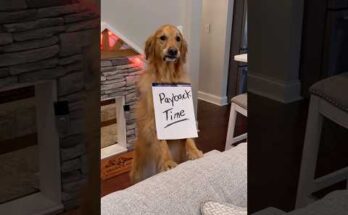My Dog Ran for President!🐶😬
Imagine waking up to a campaign slogan splashed across your TV screen: “Vote for Barkley—because he’s a good boy!” That’s exactly what happened when I decided my mutt, Barkley, should run for president. It seemed absurd at first—after all, dogs aren’t even on the ballot. But as the campaign took off, I discovered Barkley was following in the paw‑prints of some truly remarkable “pet politicians.”
In Cormorant, Minnesota, a Great Pyrenees named Duke was elected mayor… three consecutive times! A dollar per vote raised funds for village projects, and the townsfolk just couldn’t resist the charm of a canine mayor. And in Kentucky’s Rabbit Hash, Lucy Lou, that border collie, served as mayor before even throwing her leash at the U.S. presidency—she even laid out a platform supporting mental‑health spending and liberal immigration… for both cats and dogs These real stories showed me that maybe a dog running for office wasn’t as far‑fetched as I thought.
Barkley’s campaign kicked off at the local pet festival—he waddled onto a podium on custom‑made ramps (dogs can’t reach human podiums, after all!). The crowd went wild. Soon, Barkley had campaign merch—a plushie paw print button and runway‑ready bandana. His slogan? “A bone on every lawn,” riffing on those legendary mascots that charmed constituents in Sunol, California—where Bosco Ramos, a black Labrador‑Rottweiler mix, won “mayoral” fame and even got a statue
With Barkley’s platform centered on community dog‑parks, free vet‑days, and equitable mailman‑treat distribution, local media caught wind of the story. Soon we had interviews: “What Barkley lacks in speech he makes up in slobbery charisma!” crowed one anchor. It felt a little like FDR’s press defense of his terrier, Fala, during the 1944 campaign. Fala got roped into politics when foes accused FDR of sending a warship to retrieve the dog—Roosevelt quipped, “Fala was furious!” thus turning the rumor into a winning PR moment citizens: joggers, postmen, even the mayor. The internet went wild. Soon Barkley memes were trending, and people shared candid shots of him napping in campaign hats and wagging through his “victory walks.”
By the time the primary season rolled around, Barkley had raised enough donations—not in dollars, but in social media ad‑reach—to stump in a few local debates (humans spoke on his behalf). His platform? Simple: better dog‑park infrastructure, mandatory belly rubs in all day‑cares, and a united front between cats and dogs—“because collar or kitty, we all deserve treats.”
Of course, Barkley didn’t actually appear on the presidential ballot—but that wasn’t the point. His candidacy sparked genuine conversation about community, kindness, and non‑partisan cooperation. People brought their dogs to rallies, shared treats, and hosted cleanup drives. For a fleeting moment, Barkley united a town more effectively than any suit‑wearing politician.
But by election day, Barkley “lost” to the incumbent—but garnered a surprising 12% of write‑in votes. The town council even invited him to serve—officially—as “Canine Ambassador,” promoting pet welfare and volunteer outreach.
Later, at the celebratory parade, Barkley rode in a convertible, tongue flapping in the breeze, his bandana shimmering like a campaign banner. He’d run his race—not for power, but for joy, unity, and memory‑making.
In the end, Barkley showed us that politics can be playful, compassionate, and inclusive—qualities we sorely need. He reminded us of Duke’s community projects, Lucy Lou’s progressive stands, Bosco Ramos’ legacy, and Fala’s dignified pooch diplomacy. Maybe next time, Americans will ask: if a dog can teach us bipartisanship, empathy, and silliness, maybe we humans can run better too.



